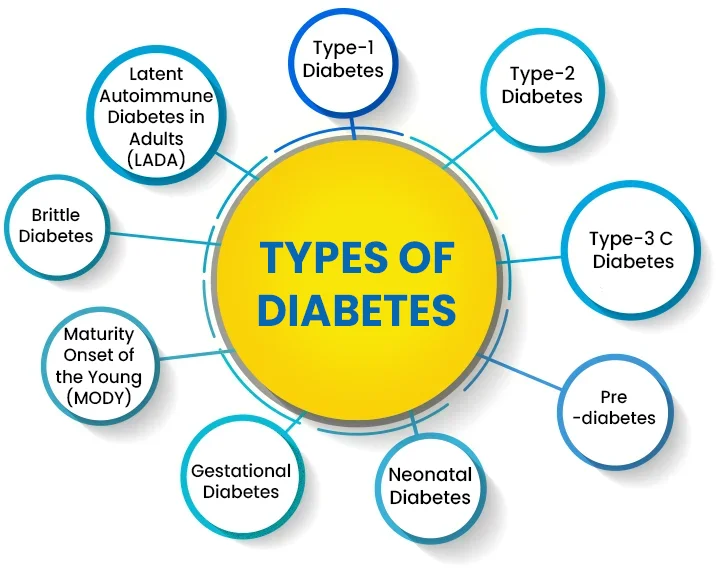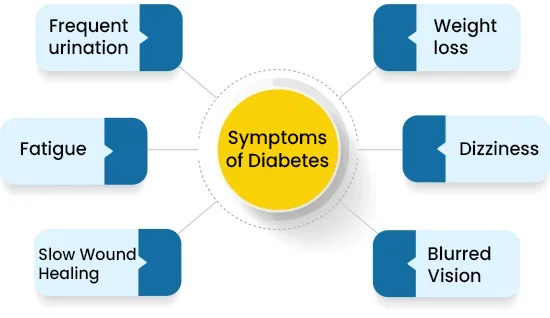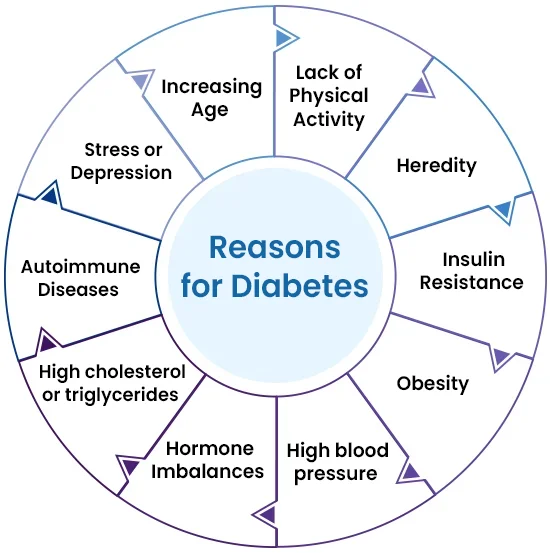
Save tax up to ₹75,000~ u/s 80D
Save tax up to ₹75,000~ u/s 80D
Diabetes is a metabolic disorder that occurs when your body fails to produce enough insulin.
Insulin is a natural hormone responsible for controlling glucose levels in the blood. It typically ensures that glucose in the bloodstream reaches the cells and can be converted to create energy. Low insulin levels in the body may result in glucose not reaching the blood cells and accumulating in the blood—this accumulated glucose in the blood further results in diabetes.
At Care Health Insurance, we meet the diverse healthcare needs of every household with some of our best diabetes insurance plans in India. Here are some of our top-selling health insurance plans:

Generally, diabetes can be categorised in the following ways.

Diabetes is a common health condition across the globe. According to a Lancet report, 10.1 crore people in India are suffering from diabetes, and 13.6 crore people have pre-diabetes.
The study states that there were 7 crore diabetes patients in 2019, an increase of 44%. The research states that 15.3% of people in India have pre-diabetes. Type 2 diabetes is the most common type of diabetes, affecting 90% to 95% of people. About 537 million adults worldwide have diabetes.
Experts estimate that, at the rate at which diabetes is increasing, the number of people with diabetes will reach 643 million by 2030 and 783 million by 2045.
It is essential to recognise the symptoms of diabetes to monitor and treat the condition timely. The symptoms of diabetes are as follows:-

In the long run, high glucose levels can cause complications related to vital organs such as the heart, kidneys, eyes, and nervous system.
To identify the blood sugar levels, your doctor may conduct one of the below-mentioned tests:
People suffering from diabetes may have serious long-term complications. These complications can have a serious effect on many parts of the body and can be fatal. Let's learn about the acute and long-term complications of diabetes.
Long-term problems can arise when blood sugar stays high for a long time. It can have serious effects on many parts of the body. Heart problems are the most common type of long-term diabetes complications. They include:
Other complications of diabetes include:
The causes and prevention of diabetes are as follows.

In type 1 diabetes, the immune system works against the body and attacks the insulin-producing cells in the pancreas. Genetic or environmental factors can cause this type of diabetes.
Type-2 diabetes is a metabolic disorder characterised by insulin resistance where the body is unable to use it effectively. This condition is caused by several factors, such as:
If a person's blood sugar level is high or symptoms of high blood sugar are visible, such as frequent urination, dehydration, increased hunger, etc., you must consult a doctor. If your condition is serious, the doctor may refer you to an endocrinologist or diabetes specialist.
>>The burden of medical expenses gets eased if you choose customised health insurance plans that provide health protection for diabetes.
A blood test is first required to determine your diabetes and blood sugar levels. Treatment depends on the extent of your condition. Diabetes prevention involves a combination of lifestyle changes and medication.
Diabetes affects not only your physical health but also your mental health. Therefore, a holistic approach to managing diabetes is important. Mentioned below are a few things that you can do to keep diabetes in check:
As far as medication is concerned, the first class of drugs prescribed for diabetic patients is metformin, which helps in lowering blood sugar levels.
In severe cases of diabetes, patients may require insulin injections. Inhaled insulin medications are also available and have become convenient for patients. Diabetics must keep a check on their glucose level and not let it drop too low, as it may cause a condition called hypoglycemia. The symptoms of hypoglycemia may include sweating, shaking hands, fatigue or fainting. In such a case, the patient should have some fast-acting sugar substance to control these effects.
Diabetes is a lifelong disease. Therefore, knowing about its symptoms and treatment is very important to maintaining good health. One can lead a normal life with self-care, medication, and constant monitoring even if they are diagnosed with diabetes.
When dealing with diabetes, it is extremely important to have a plan in place to manage your condition effectively. When complications arise, ongoing therapy involving medication or surgery is necessary. Having a Diabetes health plan becomes prudent given the rising cost of medical treatment in today’s time.
Health insurance coverage provides financial support in a medical emergency so you can focus on treatment without stress. Buying a diabetes health insurance plan can prove beneficial for you.
Disclaimer: Plan features, benefits and coverage may vary. Please read the brochure, sales prospectus, terms and conditions carefully.
Look for hospitals around you


Get the best financial security with Care Health Insurance!
Sales:1800-102-4499
Services:
8860402452
Live Chat
^^Number of Cashless Healthcare Providers as Feb 2025
**Number of Claims Settled as of 31st March 2024
^10% discount is applicable for a 3-year policy